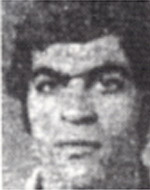Zaguri, Amir (Badri)
Son of Hanna and David, was born in 1944 in Iraq. He immigrated with his parents to Israel in 1951 and the family settled in Ashkelon, where he began his studies in elementary school. At the age of 12 he moved to Kibbutz Keremia in the south as part of the Youth Aliyah Department of the Jewish Agency. Amir was educated in the kibbutz and after completing his junior high school began working in the field of agriculture. In July 1962 he was promoted to the rank of sergeant and was promoted to the rank of sergeant in December 1963. After his discharge from the regular service, he began to work in an earthworks contractor, and he married and had his children. When the Six Day War broke out, Amir fought with his unit in the Paratroopers Brigade, and during the Yom Kippur War he fought as a parachutist, and when he was offered to move to a rear unit after the war, Aviv, and began to work as an independent, and continued to serve in the paratroopers unit when a peace war broke out The Galilee was recruited and assigned as a commander in the reconnaissance unit of the Armored Corps unit on June 10, 1982, when the APC was hit by enemy fire and Amir was killed. He was 38 when he died. He was laid to rest at the military cemetery in Holon. He left behind a wife, two twin sons, two twin daughters, parents, two brothers and three sisters. Defense Minister Ariel Sharon wrote in a letter of condolence to his family: “Sergeant Amir Zaguri gave his life for his homeland, he fell in the Lebanon Valley, served in the Paratroopers Brigade and recently served in the Armored Corps. “He said. The commander of his unit wrote to his family: “Amir was a commander in the patrol unit, and he led the supply convoy when his armored personnel carrier was hit. He was an excellent commander, a warm and pleasant friend. He carried out his tasks quietly and surreptitiously, and with his great eyes he could read his thoughts. Four years ago, I spoke to him and looked for a way to make things easier for him in reserve duty. Amir and his wife had twins. He rejected outright any proposal to transfer him from the battalion to a rear unit. He saw service in a combat unit in the patrol unit as an inalienable right. “
